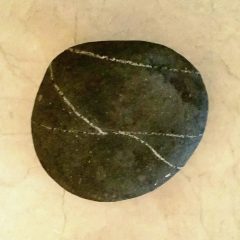Call of the Wild
The early spring peepers
insisted on their portion
of silence this evening,
and filled it fully with
their shrill mantra, they
drowned out all birds,
both dogs, and the hen
late to cackle the arrival
of her egg. Peter and I
heard something strange
as we walked by a bend
in the creek and stopped
to look for a gaggle
of turkeys. We descended
the ravine to the creek
in a classic pincer, him
to the west, me to east,
and the crazy rumble
of song did not desist
until we were practically
on top of it. Not turkeys.
not anything. No ripple
in the stagnant water,
no rustle in the leaves.
Was it such a pure song
meant for no one? Or
did our approach sound
like the right kind of love
for a prince well hidden
in the dank, earthen thaw?
I can remember my spring
and the heartbreak to have
such a declaration foiled,
and to take up hiding again.
We crawled up the opposite
side, identified some edibles,
and looked for brookies
under the cutbank mosses.
I got a lesson in the paired
branching of twigs in the new
growth of hickory trees.
Peter is a botanist for the State.
The peepers started up again
when we were not too far gone.
But the more crazed gloat
from the creek that confused
us both I did not hear again
until my wife and I went out
to have dinner on the deck.
.
Supermarket Attraction
He could not see how they got
the vortex to spin so fast along
the sides of the swimming pool
set-up in the parking lot. He was
on another round of errands
with his mother in an outfit that
didn’t fit—short sleeved plaid
shirt from the previous summer,
tube socks blown from his calves
and creeping into the heels
of his white dress shoes, the only
ones he could grab in her rush.
He felt awkward, self-conscious.
His brother’s old shorts were big
around the waist. Under the canvas
shelter, the children leaned over
the edge of the pool on a makeshift
boardwalk with little fishing poles
tied with a line and a hook.
Indiscernible trout teamed below,
and a man with yellow slacks
and a rose suit jacket was selling
worms. He knew what fishing was
from pictures of his father
and brother high in the Sierra.
You cast and reel-in line. You don’t
use worms. You cast and draw
them out with spinners and flies,
always with your father beside you,
And in the photo with you, modeling
your catch. He wanted to know how
they made the water move against
the curved sides of the pool
beneath him. He could barely see
the thin trout press the current.
To either side little girls and their
parents dipped their baits for easy
catches. He saw a photo stand,
a backdrop of a mountain lake,
and an extra charge. Kids vied
for a better place to stand around
the round sides of the pool, a grey
unbroken expressionist streak of fish
bodies staining the blue foam
in the circling current. Before he
knew it his mother came down
the boardwalk bringing him a rod
baited with a red worm loosely
threaded just past the barb. He
recoiled from the pool, his socks
crawling further into his shoes,
but he did what was expected.
The quick mysterious wave relieved
The hook of its worm before it reached
any fish. He stood a minute more,
followed the water with his eyes,
observed the unmoving shadow
of fish in the undercurrent ringing
the pool. He leaned the pole carefully
along the railing, then, pulling
at the waistband of his shorts,
quickly joined his mother,
already waiting in the car.
.
C. Mikal Oness is the author of Oracle Bones, winner of the Lewis & Clark Poetry Prize, and Water Becomes Bone (New Issues Press). His poems have appeared in numerous journals throughout the U.S. In 2017, his poem, “On the Sprocket Side of the Hayrake” was a finalist for the Ireland’s Ballymaloe Poetry Prize and appeared in The Moth. He lives on a cottage farm in Southeastern Minnesota with his wife, Elizabeth Oness. He is the founding editor of Sutton Hoo Press, a literary fine press (www.suttonhoopress.com) as well as a new imprint The Last Press (www.thelastpress.com). He is also a potter and a re-emergent alpinist hungrily exploring our diminishing natural world.
.
